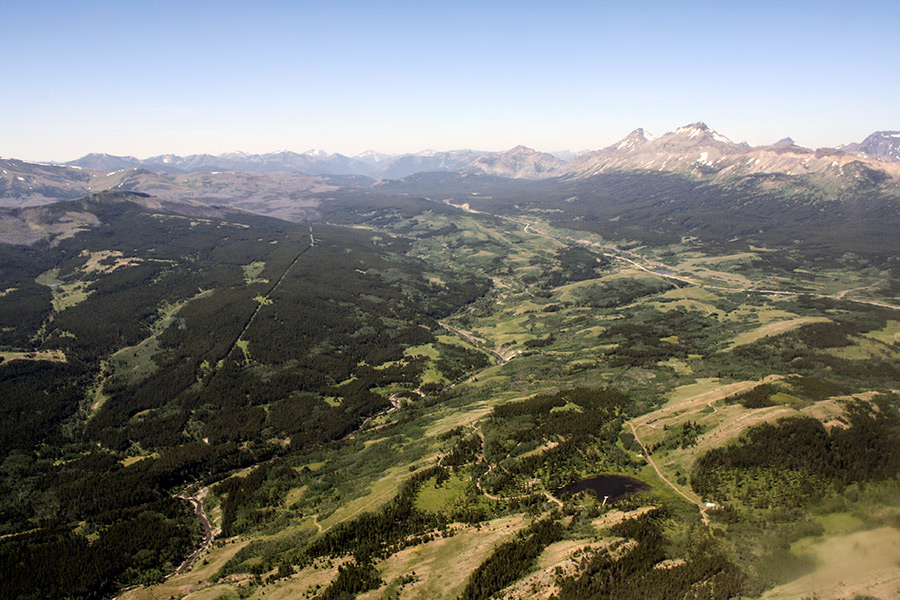Land Managers Propose Timeline to Decide Drilling on Sacred Badger-Two Medicine
Federal agencies consider canceling leases outright in court-ordered schedule
By Tristan Scott
Public land managers have submitted a court-ordered schedule framing the steps they’ll take to either lift a suspension of oil and gas drilling on a prized and culturally sacred landscape adjacent to Glacier National Park or cancel the energy leases outright.
In setting the schedule, federal land managers for the first time are considering the dissolution of energy leases in the Badger-Two Medicine area as an option to settle a dispute over whether they were granted illegally, as leaders of the Blackfeet Nation contend. The Badger-Two Medicine is home to the Blackfeet creation story and is at the center of a hard-fought legal battle, with the lease-holder calling for the drilling suspension to be lifted on one side and a vast coalition of tribes, conservation groups and Montana politicians urging permanent protection on the other.
The timeline to resolve the decades-old suspension of an energy lease in the Badger-Two Medicine was drafted after a federal judge ordered the U.S. Department of Justice, the Bureau of Land Management and the U.S. Forest Service to draft a schedule for the agencies to complete their review.
The leases in contention are held by Sidney Longwell, of the Louisiana-based Solenex LLC, which has sued in an effort to lift the suspension and fast track drilling on the 6,200-acre oil and gas lease it acquired in 1982.
U.S. District Judge Richard Leon previously denied Solenex’s request to immediately lift the suspension, but he ordered the government to come up with a timeline to end the lengthy delay, which he decried as unreasonable.
Longwell’s attempt to explore the area for oil and gas has been stymied by lawsuits from environmental groups, and, most recently, by a review of the impacts drilling would have on the area, which is designated a Blackfeet Traditional Cultural District, located in the Lewis and Clark National Forest.
Leases covering approximately 40,000 acres remain in the Badger-Two Medicine, and removing the leases is the only remedy, according to tribal leaders and attorneys representing the conservation groups. The tribe argues the leases violate both the National Environmental Policy Act and the Endangered Species Act and were granted with neither tribal consultation nor a review of cultural resources.
The land managers’ two-year plan proposes possible futures that include allowing the company to drill and canceling its leases.
Tim Preso, an attorney with Earthjustice representing a coalition of environmental groups, said he is pleased with the government’s proposed timeline in that it raises the cancellation of leases as a proposed remedy. Preso said numerous other energy leases granted at the same time as the Badger-Two Medicine leases have been found to violate federal law, including leases on the North Fork Flathead River.
The Badger-Two Medicine is no different, he said.
“We and the Blackfeet tribe have formally requested that the government cancel the leases on the basis that they were illegal, and that they arose at the same time as other leases found to be illegal,” Preso said. “Until now the government hadn’t said much in response to those overtures but now we see that they are formally going to consider the lease-cancellation option, so of course we are pleased to see that. We continue to maintain that the only acceptable outcome is cancellation of the leases.”
The schedule submitted by Department of Justice attorney Ruth Ann Storey calls for BLM to decide by Nov. 30 to take one of two directions – decide to cancel the lease, a process that would take until March 30 to complete, or decide to continue the process of lifting the suspension.
William Perry Pendley, an attorney representing Solenex, said the schedule is disappointing and should seek to resolve the issue in weeks or months rather than years.
“It’s very discouraging to see the government’s response. This thing has been going on since 1983 and the federal government, all they can see is months and even years of more delay,” Pendley said.
He said the breakdown in negotiations with the tribe was also disappointing, but that the Blackfeet leaders’ all-or-nothing style of compromise was counterproductive.
“The tribe does not want us to obey the law, does not want to mitigate or minimize the impact on cultural resources, it simply just wants the lease to go away,” he said.
The review seeks to weigh industrial interests against the cultural values of the sacred lands and is standard whenever companies seek to operate in a designated “Traditional Cultural District” such as the Badger-Two Medicine.
The Blackfeet Nation was not party to the government’s Aug. 17 response, though tribal members said its outcome will determine much for the tribe’s future.
Dale Fenner, a local Blackfeet resident noted that, “The government’s response affects us. Anything that hurts the Badger-Two Medicine threatens Blackfeet identity and is unacceptable to our people. As a young person in this community, I now call on all Blackfeet to get involved.”
The next step is for the judge to review the schedule submitted by the government. The judge can accept it as-is, request modifications, or reject it and issue a revised ruling. According to the order, once the judge approves the timetable, the government must adhere to it; failure to comply could lead to “a judicial order lifting the current suspension entirely.”